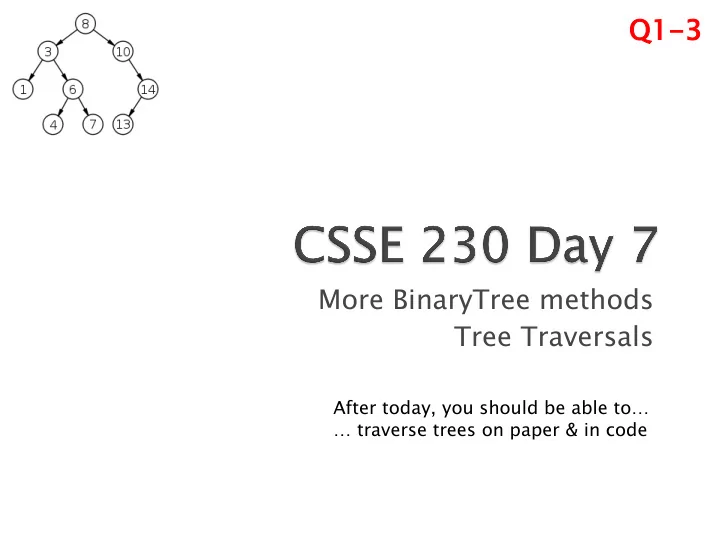

Q1 Q1-3 More BinaryTree methods Tree Traversals After today, you should be able to… … traverse trees on paper & in code
} Doublets is next assignment. } Also with a partner – meet later during today's class. } Instructor demo later too.
} Please complete the Stacks&Queues partner evaluation in Moodle after you submit your final code. Due as soon as you submit the project (or by Mon night). } Optional Exam 1 review session: ◦ Tue 9/18 from 8–11pm, Percopo classroom, led by Connor Boyle } Questions (exam, Stacks & Queues, HW3)?
Quiz question: What became clear to you as a result of class? CSSE230 student: I was tre tree ted to some good knowledge by the time I le leaf t.
NULL_NODE 1 possibility for children: Both 4 possibilities for children (leaf, Left only, Right only, Both) (which could be NULL_NODE)
Simpler Simpler
Comment out unused tests and uncomment as you go Write containsNonBST(T item) now.
} If (node is null) ◦ Return something simple } Recurse to the left } Recurse to the right } Combine results with this node
} If (node is null) ◦ Return something simple } Recurse to the left } Recurse to the right } Combine results with this node
} If (node is null) ◦ Return something simple } Recurse to the left } Recurse to the right } Combine results with this node
} Print the tree } If (node is null) contents ◦ Return something } Sum the values of simple the nodes } Dump the contents } Recurse to the left to an array list } Recurse to the right } Lots more } Combine results with this node } In what order should we print nodes?
4-7 } InOrder (left-to-right, if tree is spread out) ◦ Left, root, right } PreOrder (top-down, depth-first) ◦ root, left, right } PostOrder (bottom-up) ◦ left, right, root } LevelOrder (breadth-first) ◦ Level-by-level, left-to-right within each level
If the tree has N nodes, what’s the (worst- case) big-Oh run-time of each traversal?
8 } Brainstorm how to write: public ArrayList<T> toArrayList() } Then BST toString() will simply be: return toArrayList().toString();
Size(), height(), contains(), toArrayList(), toString(), etc. What if we want an iterator (one element at a time)? Next class
Recommend
More recommend